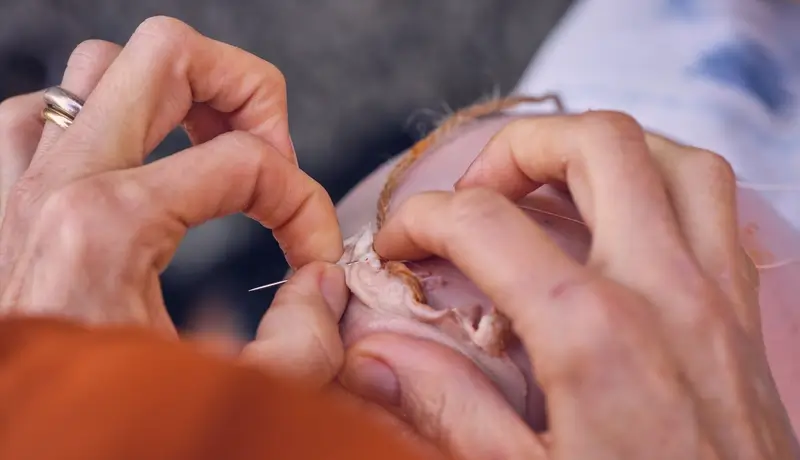Wound suturing is a critical medical procedure used to close cuts, lacerations, or surgical incisions to promote proper healing and reduce the risk of infection.While many people associate suturing with hospital visits, advancements in home healthcare have raised the question of whether a doctor can safely perform this procedure at home.Wound suturing involves more than simply stitching the skin together.It requires precise assessment of the wound type, depth, location, and potential complications.
When Home Suturing Might Be Possible
Doctor at home Dubai can handle certain types of wounds effectively. These typically include minor lacerations that are clean and manageable without extensive surgical intervention.Professional judgment is essential to determine whether the wound can be sutured at home or if a hospital setting is safer. The decision often depends on the size of the wound, risk of contamination, and the patient’s overall health.
Preparation for Home Suturing
Proper preparation is crucial to ensure safety and effective healing. The doctor first evaluates the wound to ensure it is suitable for suturing. This assessment includes checking for foreign objects, infection signs, and the wound’s depth and length. The area is then cleaned thoroughly using medical antiseptics to minimize infection risk. Local anesthesia is usually administered to ensure the patient experiences minimal discomfort during the procedure.
The Suturing Procedure
During home suturing, the doctor uses sterile instruments to close the wound. Sutures are chosen based on the wound type and location. The doctor carefully places each stitch to align the skin edges accurately, which helps in minimizing scarring and promoting faster healing. Attention to detail during this process is vital to avoid complications and ensure that the wound heals properly.
Advantages of Home Suturing
Home suturing provides several benefits for patients. It offers convenience for individuals with limited mobility or those unable to travel easily to a medical facility.Receiving care at home can reduce stress and anxiety associated with hospital visits. The procedure in a familiar environment can make patients feel more comfortable and relaxed.
Safety Considerations
Safety is a primary concern when performing wound suturing at home. The doctor must maintain strict hygiene standards to prevent infection. This includes sterilizing all instruments, using gloves, and ensuring the suturing area is clean. Monitoring the wound during the healing process is equally important, as complications such as infection or wound reopening can occur if not properly observed.
Limitations of Home Suturing
Not all wounds are suitable for home suturing. Complex wounds, deep cuts, or wounds involving significant tissue damage often require hospital care. Wounds near critical structures like eyes, joints, or major blood vessels may need specialized attention beyond what can safely be provided at home. In such cases, attempting home suturing could increase the risk of poor healing or complications.
Post-Suturing Care
After the procedure, proper care is essential to ensure the wound heals well. The doctor provides instructions for keeping the wound clean and protected. Patients are advised to monitor the area for signs of redness, swelling, or unusual discharge, which could indicate infection. Follow-up visits may be scheduled to remove sutures at the appropriate time and evaluate the healing process.
FAQs
What types of wounds can a doctor suture at home?
Doctors can typically suture minor cuts, lacerations, and small surgical wounds that are clean, shallow, and free from severe contamination.
Is home suturing as safe as hospital suturing?
Home suturing can be safe when performed by a qualified doctor who follows proper sterilization and procedural guidelines. The wound type and patient condition are important factors in determining safety.
How long does it take for sutured wounds to heal?
Healing time varies depending on the wound size, location, and the patient’s health. Minor wounds may heal within a week or two, while larger wounds may require more time.
Can sutures be removed at home?
In many cases, the doctor can remove sutures at home during a follow-up visit. Proper technique is essential to avoid reopening the wound or causing infection.
What should be avoided after suturing?
Patients should avoid touching the wound with unclean hands, applying unapproved substances, or exposing the area to excessive moisture. Following the doctor’s care instructions is key to successful healing.
Conclusion
A Doctor at home in Dubai can provide wound suturing for suitable cases, offering convenience and comfort while ensuring proper medical care. Careful assessment, preparation, and adherence to hygiene standards are critical for success.While not all wounds are appropriate for home suturing, minor and manageable cuts can often be treated safely in a home setting. With proper aftercare and monitoring, patients can experience effective healing without the need for hospital visits.









